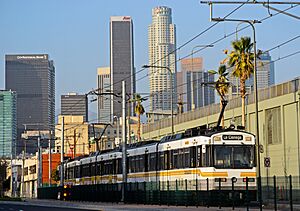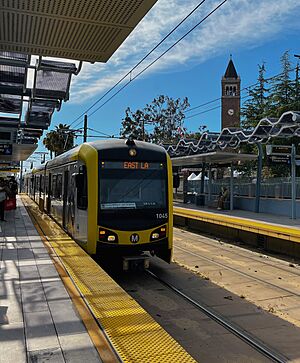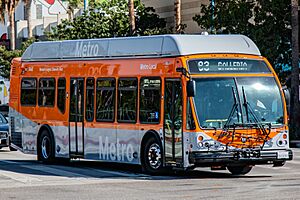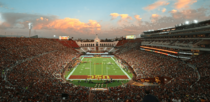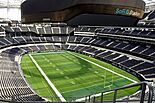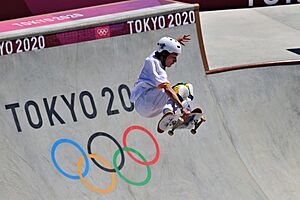2028 Summer Olympics facts for kids

One of the many variations of the Los Angeles 2028 logo
|
|||
| Host city | Los Angeles, United States | ||
|---|---|---|---|
| Events | 351 in 36 sports | ||
| Opening | July 14, 2028 (in 29 months) | ||
| Closing | July 30, 2028 (in 29 months) | ||
| Opened by |
President Donald Trump (expected)
|
||
| Stadium | Los Angeles Memorial Coliseum SoFi Stadium (simultaneous opening ceremony) |
||
| Summer | |||
|
|||
| Winter | |||
|
|||
The 2028 Summer Olympics, also known as Los Angeles 2028 or LA 28, is a huge international sports event. It will happen from July 14 to July 30, 2028, in the United States. Los Angeles will be the main host city. Some events will also take place in other cities around Greater Los Angeles and even in Oklahoma City.
Los Angeles first tried to host the 2024 Summer Olympics. But after some other cities dropped out, the International Olympic Committee (IOC) decided to pick hosts for both the 2024 and 2028 Games at the same time. Paris was chosen for 2024, and Los Angeles agreed to host in 2028. Los Angeles officially won the bid on September 13, 2017, in Lima, Peru.
This will be the fifth time the Summer Olympics are held in the United States. Los Angeles has hosted twice before, in 1932 and 1984. This makes Los Angeles the third city to host the Summer Olympics three times. The other cities are London and Paris. These Games will be the first Summer Olympics with Kirsty Coventry as the IOC President.
Some exciting sports will be part of the Games. Skateboarding, sport climbing, and surfing are now permanent Olympic sports. New sports like flag football and squash will make their debut. Also, baseball/softball, cricket (first time since 1900), and lacrosse (first time as a medal event since 1908) are returning. The modern pentathlon will have a new event, replacing horse show jumping with obstacle course racing.
Contents
How Los Angeles Won the Bid
The process to choose the host city for the 2024 Games began in 2015. Five cities wanted to host: Budapest, Hamburg, Los Angeles, Paris, and Rome. However, Budapest, Hamburg, and Rome later decided not to continue. This left only Los Angeles and Paris.
The International Olympic Committee (IOC) then thought about choosing two cities at once. On June 9, 2017, the IOC suggested picking both the 2024 and 2028 host cities at the same time. This idea was approved on July 11, 2017.
Paris was seen as the favorite for the 2024 Games. This was because 2024 marked 100 years since Paris last hosted the Olympics in 1924. On July 31, 2017, the IOC announced that Los Angeles was the only city left for 2028. Los Angeles received extra funding from the IOC for agreeing to wait.
The Los Angeles City Council voted to approve the bid on August 11, 2017. Los Angeles officially won the 2028 Games on September 13, 2017, after a unanimous vote by the IOC. The IOC president, Thomas Bach, praised Los Angeles for using many existing buildings and for getting all its money from private companies.
The state of California officially supported the LA 2028 bid on October 16, 2017. In August 2018, Olympic officials visited Los Angeles. They met with local organizers and toured new sports venues. At that time, polls showed that over 88% of people in Los Angeles supported hosting the Games. By March 2023, a poll showed 57% of people thought the Olympics would be good for the city.
Preparing for the Games
Getting Around Los Angeles
Former Los Angeles Mayor Eric Garcetti started a plan called "Twenty-eight by '28". This plan aims to finish 28 public transport projects before the Games begin. Many of these projects were already planned, but they are now being sped up. The current Mayor, Karen Bass, announced in August 2024 that Los Angeles plans for the Olympics to be "car-free." This means they want people to use public transport instead of driving. This will help reduce traffic and make travel faster. They also suggest people work from home during the event.
Improvements to public transport are paid for by special sales taxes in Los Angeles County. These taxes are called Measure R and Measure M.
One big project is extending the Metro D Line. This extension will help people get to Olympic venues. The first part of the extension was finished by 2025. The second part will reach Century City by 2026. The final part will go to Westwood by 2027. This last part will include a station near the UCLA campus. This will connect the Olympic Village to venues in downtown Los Angeles.
The Regional Connector in downtown Los Angeles was completed in 2023. This project linked different Metro lines. Now, you can travel directly by train from Santa Monica to East Los Angeles. It also connected Long Beach and the San Gabriel Valley to downtown. A new station in San Dimas will serve Bonelli Park, where mountain bike events will be held.
The K Line opened in October 2022. It connects areas like Crenshaw, Inglewood, and Westchester. The K Line will also connect to a special "people mover" at Los Angeles International Airport. This people mover is expected to open in January 2026.
LA28 organizers think Los Angeles will need about 2,700 extra buses for the Games. This would double the current number of buses. They believe the city's transport system can handle this. They are looking for government grants and other ways to pay for these new buses.
Money for the Games
In April 2019, the estimated cost for the Games was about $6.88 billion. All this money is expected to come from private companies. The budget was adjusted for inflation because Los Angeles agreed to host in 2028 instead of 2024.
The City of Los Angeles has promised to help cover any money shortages, up to $250 million. The state of California will also help with another $250 million if needed. The organizers have bought many insurance policies. These policies will help if there are natural disasters, terrorism, or if fewer tickets are sold than expected. The Games are expected to make as much money as they cost. About $2.5 billion will come from sponsorships, and almost $2 billion from ticket sales. A ticket for the Games could cost anywhere from $13 to $457 (in 2016 dollars).
Keeping Everyone Safe
The U.S. federal government will be in charge of security for the Games. An agreement was signed in February 2020 with the United States Department of Homeland Security (DHS). The government will cover security costs but not other funding for the Games.
The 2028 Olympics will be the second Olympics in the United States since the September 11 attacks in 2001. Because of this, the DHS will call the Olympics a "National Special Security Event" (NSSE). This means the United States Secret Service will lead all security efforts.
Casey Wasserman, head of the organizing committee, has said there will be no problems with visas for athletes. He also mentioned that the Games have support from both major political parties in the U.S. In 2025, $1 billion was approved for the Federal Emergency Management Agency (FEMA). This money will be used for security, planning, and other costs related to the 2028 Olympic Games.
Olympic Venues
Like the 1984 Summer Olympics, most events for the 2028 Games will be held in existing venues around Greater Los Angeles. The city's plan uses many places that are already built or were being built anyway. Most venues are grouped into "sports parks" in areas like Downtown Los Angeles, the San Fernando Valley, Carson, and Long Beach. No new permanent venues are being built just for the Games.
The Olympic Village, where athletes will stay, will be at the UCLA campus. The University of Southern California will host the Media Village for reporters.
The Los Angeles Memorial Coliseum and the Rose Bowl will host athletics and football (soccer) games. These will be the first stadiums to host three different Olympic Games. Crypto.com Arena will host gymnastics, and Intuit Dome will host basketball. BMO Stadium, which opened in 2018, will host flag football and lacrosse. SoFi Stadium, which opened in 2020, will host swimming events. Riviera Country Club will host golf. Cricket will be played at a temporary stadium at the Fairplex in Pomona, California.
The Coliseum had major updates from 2017 to 2019. Crypto.com Arena was also renovated, finishing in 2024. The NBA's Los Angeles Clippers opened their new arena, Intuit Dome, in August 2024. This arena will be used for basketball during the Games.
To save money and use existing places, LA28 changed some venue plans in June 2024. The temporary swimming pool planned for USC's Dedeaux Field was canceled. Instead, swimming will be at SoFi Stadium, artistic swimming in Long Beach, and diving at the historic LA84 Foundation/John C. Argue Swim Stadium. SoFi Stadium will be the largest swimming venue in Olympic history, with space for 38,000 fans. Equestrian events will return to Santa Anita Park, which hosted them in 1984. Softball and canoe slalom events were moved to existing venues in Oklahoma City, Oklahoma.
Images for kids
-
Los Angeles Memorial Coliseum Olympic Cauldron, used at the 1932 and 1984 Summer Olympics
-
Night view of Crypto.com Arena (formerly known as Staples Center)
-
UCLA student housing site of the Olympic Village
Torch Relay
The CEO, Reynold Hoover, announced that the LA28 team plans a torch relay across all 50 U.S. states. This relay aims to "bind the nation with LA." The relay is expected to start in April 2028.
The Games Themselves
Opening and Closing Ceremonies
On May 21, 2025, the LA28 organizing committee announced how the ceremonies would work. The opening ceremony will be held at both SoFi Stadium and the Los Angeles Memorial Coliseum. The closing ceremony will take place at the Coliseum.
The idea of using both stadiums for the opening ceremony was discussed back in 2017. The plan is for a part of the opening ceremony to happen at the Coliseum. Then, the rest of the ceremony, including the official parts, will be shown live from SoFi Stadium on big screens. The closing ceremony will start at SoFi Stadium and finish at the Coliseum.
Sports and Events
The 2028 Summer Olympics will feature 351 events across 36 sports. This is an increase of 22 events and four sports compared to the 2024 Summer Olympics. The Games will include the 28 "core" Olympic sports that have been played since 2016. There will also be five optional sports chosen by the organizing committee.
- Flag football (a type of American football) and squash will be new to the Olympics.
- Baseball/softball will return after being absent since 2020.
- Cricket will be back for the first time since 1900.
- Lacrosse will return as a medal event for the first time since 1908.
Also, three sports that were optional in 2020 and 2024 are now permanent. These are skateboarding, sport climbing, and surfing.
Cricket will have men's and women's tournaments in the Twenty20 (T20) format, with six teams each. Flag football will also have men's and women's tournaments. On May 20, 2025, the National Football League (NFL) said its players might be allowed to play in the men's flag football tournament. This depends on agreements with the players' union.
Lacrosse will use a faster format called "lacrosse sixes." There have been requests to let the Haudenosaunee Nationals compete. This is because lacrosse is very important to the Haudenosaunee people. Even though they don't have a National Olympic Committee, they are recognized by World Lacrosse.
Out of 16 new events suggested by existing Olympic sports, only beach sprint rowing was accepted. It will replace the lightweight double sculls category. It will have individual events for men and women, plus a mixed double sculls event. Modern pentathlon will use a new format. It will replace horse show jumping with obstacle course racing.
On April 9, 2025, the IOC announced more new events. These include a 4 × 100 meters mixed relay in athletics. Swimming will add 50-meter backstroke, butterfly, and breaststroke events. There will also be mixed team compound archery, all-around artistic gymnastics, golf, and table tennis events. In sport climbing, the combined boulder-and-lead event will be split into separate competitions. This will create six medal events.
3x3 basketball will expand to 12 teams. One more women's weight class will be added to boxing to match the men's events. Women's water polo will also expand to 12 teams. The women's football (soccer) tournament will grow from 12 to 16 teams. This shows how popular the sport is worldwide. The men's football tournament will be reduced from 16 to 12 teams. The marathon race walk mixed relay, introduced in 2024, was removed. With these changes, the 2028 Summer Olympics will have more female athletes than male athletes for the first time.
- Aquatics
- Artistic swimming (2)
- Diving (8)
- Marathon swimming (2)
- Swimming (41)
- Water polo (2)
- Archery (6)
- Athletics (48)
- Badminton (5)
- Baseball/softball
- Baseball (1)
- Softball (1)
- Basketball
- Basketball (2)
- 3x3 basketball (2)
- Boxing (14)
- Canoeing
- Slalom (6)
- Sprint (10)
- Cricket (2)
- Cycling
- BMX freestyle (2)
- BMX racing (2)
- Mountain biking (2)
- Road (4)
- Track (12)
- Equestrian
- Dressage (2)
- Eventing (2)
- Jumping (2)
- Fencing (12)
- Field hockey (2)
- Flag football (2)
- Football (2)
- Golf (3)
- Gymnastics
- Artistic (15)
- Rhythmic (2)
- Trampoline (2)
- Handball (2)
- Judo (15)
- Lacrosse (2)
- Modern pentathlon (2)
- Rowing
- Rowing (12)
- Coastal rowing (3)
- Rugby sevens (2)
- Sailing (10)
- Shooting (15)
- Skateboarding (4)
- Sport climbing (6)
- Squash (2)
- Surfing (2)
- Table tennis (6)
- Taekwondo (8)
- Tennis (5)
- Triathlon (3)
- Volleyball
- Volleyball (indoor) (2)
- Beach volleyball (2)
- Weightlifting (10)
- Wrestling
- Freestyle (12)
- Greco-Roman (6)
New and Returning Sports
Since 2020, the Summer Olympics have included "core" sports that are always there, plus up to six "optional" sports. These optional sports are chosen by the host city to make the Games more interesting locally. On December 9, 2021, the IOC suggested that skateboarding, sport climbing, and surfing become core sports. These sports were very popular when they first appeared as optional sports in 2020 and 2024.
The IOC also had some concerns about other sports.
- The International Boxing Association (IBA) had problems with how it was run and money issues. Because of this, boxing events in 2020 and 2024 were managed by a special IOC group. A new group called World Boxing was started in April 2023 to try and fix these issues. In June 2023, the IOC decided not to recognize the IBA anymore. On March 20, 2025, the IOC voted to bring boxing back to the Olympics, with World Boxing in charge.
- The International Weightlifting Federation (IWF) also faced issues with doping and how it was run. In 2022, a new president was elected, and he made changes to improve the organization. The IOC decided to keep weightlifting in the core program.
- The Union Internationale de Pentathlon Moderne (UIPM) wanted to change the modern pentathlon. They wanted to replace horse show jumping with obstacle course racing. This change was suggested after an incident in the 2020 Olympics where a coach hit a horse. The UIPM approved these changes in November 2022. They are expected to start after the 2024 Summer Olympics.
In August 2022, the LA Organizing Committee looked at nine sports to add as optional events. These included baseball/softball, breaking (breakdance), cricket, flag football, karate, kickboxing, lacrosse, squash, and motorsport. On October 9, 2023, the committee officially suggested baseball/softball, cricket, flag football, lacrosse, and squash to the IOC. All five of these sports were approved by the IOC.
Event Schedule
To allow SoFi Stadium to be used for both the opening ceremonies and swimming, the schedule for swimming and athletics events will be swapped. Athletics events will happen during the first week of the Games. During this time, SoFi Stadium will be changed to get ready for swimming competitions in the second week. This will be the first time since the 1968 Summer Olympics that athletics competitions take place in the first week.
On July 13, 2025, the organizing committee released the first version of the competition schedule.
- All times and dates use Pacific Daylight Time (UTC-7)
| OC | Opening ceremony | ● | Event competitions | 1 | Gold medal events | CC | Closing ceremony |
| July 2028 | 12th Wed |
13th Thu |
14th Fri |
15th Sat |
16th Sun |
17th Mon |
18th Tue |
19th Wed |
20th Thu |
21st Fri |
22nd Sat |
23rd Sun |
24th Mon |
25th Tue |
26th Wed |
27th Thu |
28th Fri |
29th Sat |
30th Sun |
Events | |
|---|---|---|---|---|---|---|---|---|---|---|---|---|---|---|---|---|---|---|---|---|---|
| OC | CC | N/A | |||||||||||||||||||
| Aquatics | ● | 1 | ● | ● | 1 | 2 | |||||||||||||||
| ● | 1 | ● | 1 | ● | 1 | 1 | 1 | 1 | 1 | 1 | 8 | ||||||||||
| 1 | 1 | 2 | |||||||||||||||||||
| ● | ● | ● | ● | ● | ● | ● | ● | ● | 41 | ||||||||||||
| ● | ● | ● | ● | ● | ● | ● | ● | ● | 1 | 1 | 2 | ||||||||||
| ● | 1 | ● | ● | 1 | 1 | 1 | 1 | 1 | 6 | ||||||||||||
| ● | ● | ● | ● | ● | ● | ● | ● | ● | ● | ● | ● | ● | 48 | ||||||||
| ● | ● | ● | ● | ● | ● | 1 | 1 | 1 | 2 | 5 | |||||||||||
| Baseball/Softball | ● | ● | ● | ● | ● | 1 | 1 | ||||||||||||||
| ● | ● | ● | ● | ● | ● | 1 | 1 | ||||||||||||||
| Basketball | ● | ● | ● | ● | ● | ● | ● | ● | ● | ● | ● | ● | ● | ● | ● | ● | 1 | 1 | 2 | ||
| ● | ● | ● | ● | ● | ● | 2 | 2 | ||||||||||||||
| ● | ● | ● | ● | ● | ● | ● | ● | ● | ● | ● | ● | ● | 14 | ||||||||
| Canoeing | ● | 1 | 1 | ● | 1 | 1 | ● | ● | 2 | 6 | |||||||||||
| ● | ● | ● | ● | ● | 10 | ||||||||||||||||
| ● | ● | ● | ● | ● | ● | ● | 1 | ● | ● | ● | ● | ● | ● | ● | 1 | 2 | |||||
| Cycling | 2 | 1 | 1 | 4 | |||||||||||||||||
| ● | ● | ● | ● | ● | ● | 12 | |||||||||||||||
| ● | 2 | ● | 2 | 4 | |||||||||||||||||
| 1 | 1 | 2 | |||||||||||||||||||
| Equestrian | ● | ● | 1 | 1 | 2 | ||||||||||||||||
| ● | ● | ● | 2 | 2 | |||||||||||||||||
| ● | 1 | ● | 1 | 2 | |||||||||||||||||
| 2 | 2 | 2 | 1 | 1 | 1 | 1 | 1 | 1 | 12 | ||||||||||||
| ● | ● | ● | ● | ● | ● | ● | ● | ● | ● | ● | ● | ● | ● | ● | 1 | 1 | 2 | ||||
| ● | ● | ● | ● | ● | ● | 1 | 1 | 2 | |||||||||||||
| ● | ● | ● | ● | ● | ● | ● | ● | ● | ● | ● | 1 | 1 | 2 | ||||||||
| ● | ● | ● | 1 | ● | 1 | ● | ● | ● | 1 | 3 | |||||||||||
| Gymnastics | ● | ● | 1 | 1 | 1 | 1 | 3 | 3 | 4 | 1 | 15 | ||||||||||
| ● | 1 | 1 | 2 | ||||||||||||||||||
| 2 | 2 | ||||||||||||||||||||
| ● | ● | ● | ● | ● | ● | ● | ● | ● | ● | ● | ● | ● | ● | 1 | 1 | 2 | |||||
| 2 | 2 | 2 | 2 | 2 | 2 | 2 | 1 | 15 | |||||||||||||
| ● | ● | ● | ● | ● | 2 | 2 | |||||||||||||||
| ● | ● | 1 | 1 | 2 | |||||||||||||||||
| Rowing | ● | ● | 2 | 2 | 2 | 2 | 2 | 2 | 12 | ||||||||||||
| 1 | 1 | 2 | |||||||||||||||||||
| ● | ● | 1 | ● | ● | 1 | 2 | |||||||||||||||
| ● | ● | ● | ● | ● | ● | ● | ● | ● | ● | ● | 10 | ||||||||||
| ● | ● | ● | ● | ● | ● | ● | ● | ● | ● | ● | 15 | ||||||||||
| ● | 1 | 1 | ● | 1 | 1 | 4 | |||||||||||||||
| ● | ● | ● | ● | ● | ● | 6 | |||||||||||||||
| ● | ● | ● | ● | ● | ● | ● | ● | 1 | 1 | 2 | |||||||||||
| ● | ● | ● | 2 | 2 | |||||||||||||||||
| ● | ● | 1 | 1 | 1 | ● | ● | 1 | 1 | ● | ● | ● | ● | ● | 1 | 6 | ||||||
| 2 | 2 | 2 | 2 | 8 | |||||||||||||||||
| ● | 1 | ● | ● | ● | ● | ● | ● | 2 | 2 | 5 | |||||||||||
| 1 | 1 | 1 | 3 | ||||||||||||||||||
| Volleyball | ● | ● | ● | ● | ● | ● | ● | ● | ● | ● | ● | ● | ● | 1 | 1 | 2 | |||||
| ● | ● | ● | ● | ● | ● | ● | ● | ● | ● | ● | ● | ● | ● | 1 | 1 | 2 | |||||
| 2 | 2 | 2 | 2 | 2 | 10 | ||||||||||||||||
| ● | 3 | 3 | 3 | 3 | 3 | 3 | 18 | ||||||||||||||
| Daily medal events | 0 | 351 | |||||||||||||||||||
| Cumulative total | 0 | 351 | |||||||||||||||||||
Marketing the Games
The Olympic Emblem
On September 1, 2020, the LA28 organizing committee showed off the emblem for the 2028 Summer Olympics. It features the letters "LA" and the number "28" stacked on top of each other. The "A" in "LA" can change its look. Many different versions were created with help from American athletes, artists, designers, and famous people. These include musician Billie Eilish and actress Reese Witherspoon. One version is inspired by the "Stars in Motion" emblem from the 1984 Summer Olympics.
After the 2024 Games ended, another special version of the logo was revealed on August 12, 2024. This one honored Kobe Bryant, a famous basketball player. Bryant had supported Los Angeles hosting the 2028 Games before he passed away in 2020. His widow, Vanessa, designed this logo. Its "A" has a snakeskin pattern in the colors of the Los Angeles Lakers team. It also includes Bryant's "Black Mamba" symbol.
Casey Wasserman explained that having many different versions of the emblem shows the community's creativity. It also celebrates the diversity that makes Los Angeles strong. He said the city "defies a singular identity." Amy Gleeson, the chief marketing officer, said the emblem was designed to connect with young people. These young people will be in their 20s and 30s when the Games happen.
Sponsors and Partners
The LA2028 organizing committee is working with NBCUniversal. NBCUniversal owns the rights to broadcast the Olympics in the U.S. They are working together to sell sponsorships for the Games. As part of this deal, NBCU's parent company, Comcast, is a "Founding Partner" of LA 2028.
| Sponsors of the 2028 Summer Olympics | ||||
|---|---|---|---|---|
Worldwide Olympic Partners
|
||||
Founding Partners
|
||||
Official Sponsors
|
||||
Official Supporters
|
||||
Official Ticketing / Hospitality Partners
|
Watching the Games
Broadcasting Rights
In the United States, the Games will be shown by NBCUniversal. This is part of a long-term agreement with the IOC that goes until 2032. Hollywood Park Studios is planned to be the main broadcast center for the Games.
On January 16, 2023, the IOC renewed its agreements with Warner Bros. Discovery for European TV and streaming rights. This covers 49 European countries until 2032. Free-to-air TV rights were also given to the European Broadcasting Union (EBU) and its members. Each broadcaster will show at least 200 hours of the 2028 Summer Olympics.
See also
 In Spanish: Juegos Olímpicos de Los Ángeles 2028 para niños
In Spanish: Juegos Olímpicos de Los Ángeles 2028 para niños
- 2028 Summer Paralympics
- Olympic Games celebrated in the United States
- 1904 Summer Olympics – St. Louis
- 1932 Summer Olympics – Los Angeles
- 1932 Winter Olympics – Lake Placid
- 1960 Winter Olympics – Squaw Valley
- 1980 Winter Olympics – Lake Placid
- 1984 Summer Olympics – Los Angeles
- 1996 Summer Olympics – Atlanta
- 2002 Winter Olympics – Salt Lake City
- 2028 Summer Olympics – Los Angeles
- List of IOC country codes
- Casey Wasserman – head of the Organizing Committee
 | Valerie Thomas |
 | Frederick McKinley Jones |
 | George Edward Alcorn Jr. |
 | Thomas Mensah |


